We hand the waitress the key with the number 30 on it, and she leads us to the “secret room.” It’s darkly lit, the walls adorned with paintings that incorporate colorful designer vibrators, and towels emblazoned with suggestive phrases hanging from racks.
“This is Anita, she is the only staff here whom you can touch however you want,” the waitress says while pointing to a bathtub against a back wall.
I grope the rubbery, lifeless sex doll, and that was the highlight of the experience at The Room Bistro (房間餐酒), a sex-toy themed establishment. Okay, the food was pretty decent, but I was half-expecting something raunchier. There’s also the tagline, “Are you ready to release every cell in your body and use your most primal instincts to enjoy the direct stimulation of your senses?”
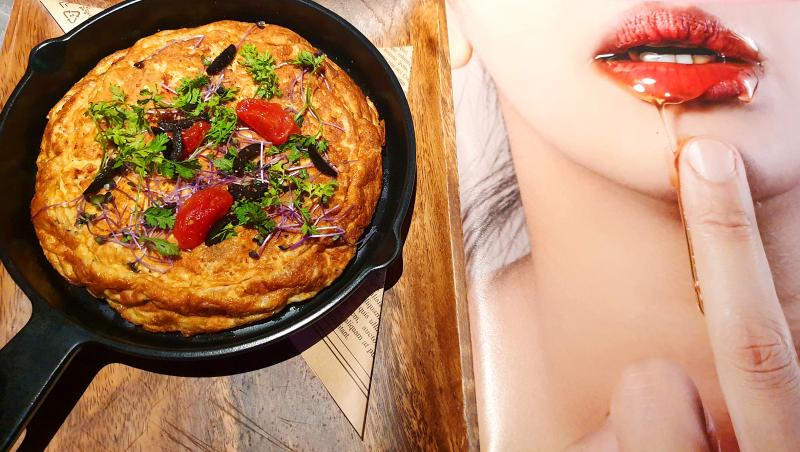
Photo: Han Cheung, Taipei Times
That doesn’t really happen. For those who are too timid to enter a sex store, this place is plenty edgy and could serve as a gentle introduction to the great unknown. However, it still felt that the kinky side was mostly a gimmick to attract the curious. Such is the case for most themed restaurants — remember the vampire restaurant or the toilet cafe?
Fortunately, Room Bistro isn’t quite that tacky, with more substance and thought put into it than the now-defunct Funny Sex Restaurant in Kaohsiung, where almost everything was genital or breast-shaped in some way.
But Room Bistro goes too far in the other direction. There was one table examining and discussing sex toys while enjoying drinks, but the others acted like regular diners. The staff were dressed exactly as if they were in your average lounge bar with no, um, embellishments. They try with the menu — which doubles as a product catalogue, full of suggestive pictures of models posing with food and pleasure devices as well as condoms and handcuffs — with cocktail names like “You are the ocean who makes me wet every night,” but the idea is still rather derivative.
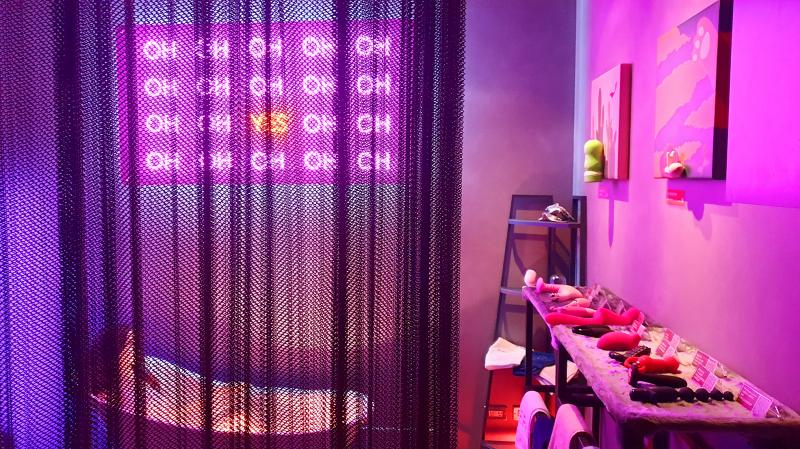
Photo: Han Cheung, Taipei Times
HANDCUFFS, WHIPS AND DILDOS
And couples were using the bed in the middle, which came complete with handcuffs, whips and dildos that were scattered across as a backdrop for their Instagram selfies. I mean, what else are you going to do with a double-headed dildo in the middle of a public dining space anyway? While the mannequins on the bed in the throes of passion are eye-catching, they occupied most of the space instead of leaving room for the customers to get creative with their selfies. At least there could be subtle options such as eating while blindfolded or handcuffed to the table.
Anyway, it appears that the business model works, as the place is often fully booked on weekends.
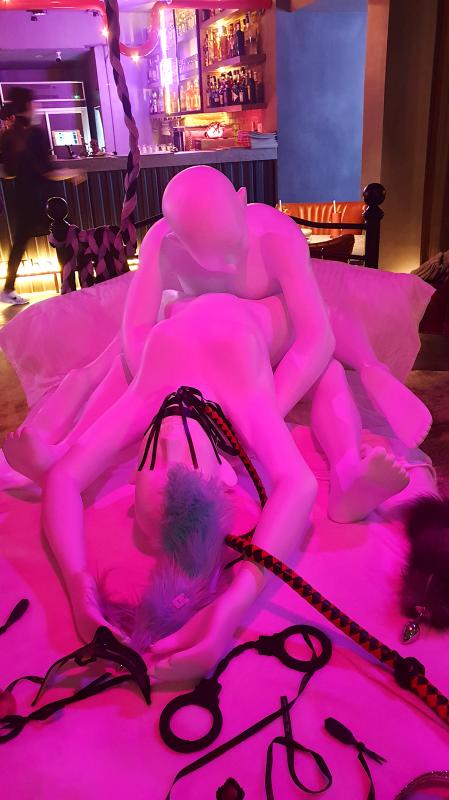
Photo: Han Cheung, Taipei Times
One could argue that the food was indeed “sensual,” with layered flavors and intricate textures, and if those who need more stimulation can order a wide array of sauces for NT$40 each. We order the fritata (NT$250), which was cooked to the right amount of fluffiness but surprisingly stuffed with chewy bits of what seems to be tapioca, as well as pig’s blood cake.
I try dipping it in the three sauces we requested: Malaysian Lover bah kut teh (pork rib soup), Afternoon Wife pomelo pepper mayonnaise and Shanghai Nights Shaoxing wine vinegar. The mayonnaise is way too salty, overpowering the pomelo and the pepper flavors and leaving only spiciness. The vinegar is refreshing and has pleasant undertones of the signature wine flavor, but the bah kut teh is the best, just the right balance of sweet and savory with the distinct medicinal herb aftertaste of the broth slowly seeping across the tastebuds. I end up mostly using the bah kut teh sauce for the remaining two dishes.
Next is the “There’s a lot two people can do” luwei — a type of soy-sauce marinated braised snack food — set, (NT$350) with beef, asparagus, mushrooms and tofu. The morsels each offer distinct textures, and could be consumed without the sauces as they are already lightly braised with soy sauce and smoked. The smoky flavor interacts well with the medicinal bah kut teh aftertaste too.
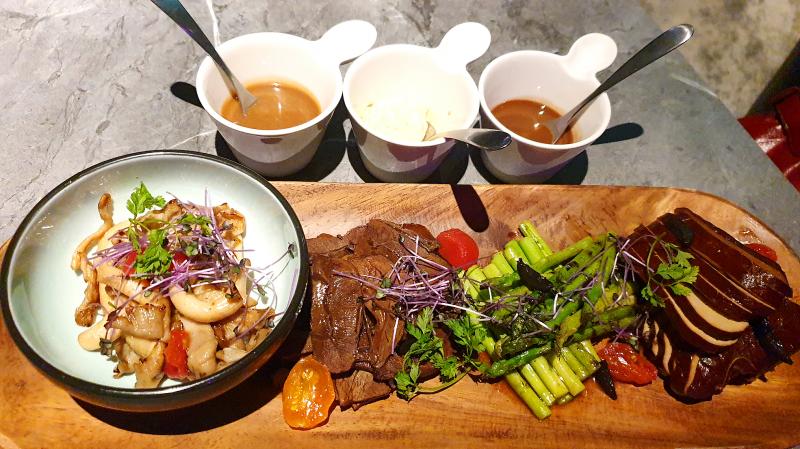
Photo: Han Cheung, Taipei Times
The “Beer Trap” braised pork leg (NT$450) was tender and juicy, with the slightly sour beer marinade soaking through the meat. It came with an array of succulent vegetables such as red pepper and baby corn. We wondered aloud whether the items were meant to look phallic.
The food is enjoyable, but it does not stand out enough for a repeat visit, especially since the sensual theme leaves much more to be desired. Perhaps if it holds any special events — even just a sex toy demonstration — it might be worth going back to take a look. Otherwise, most people will probably visit once to get that selfie.
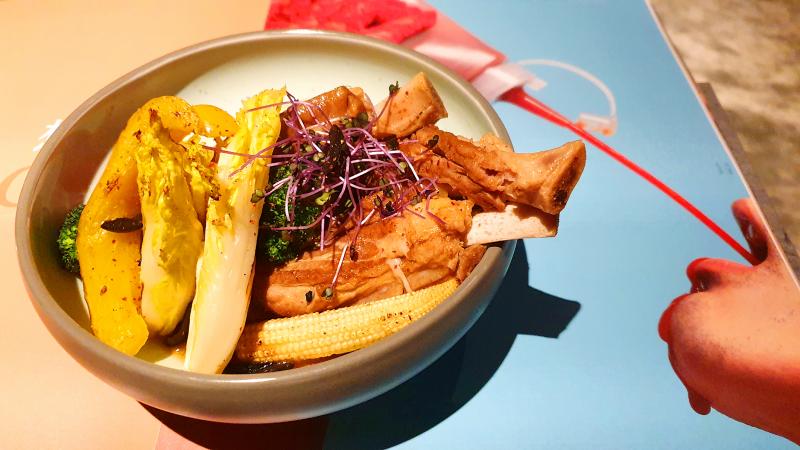
Photo: Han Cheung, Taipei Times

Google unveiled an artificial intelligence tool Wednesday that its scientists said would help unravel the mysteries of the human genome — and could one day lead to new treatments for diseases. The deep learning model AlphaGenome was hailed by outside researchers as a “breakthrough” that would let scientists study and even simulate the roots of difficult-to-treat genetic diseases. While the first complete map of the human genome in 2003 “gave us the book of life, reading it remained a challenge,” Pushmeet Kohli, vice president of research at Google DeepMind, told journalists. “We have the text,” he said, which is a sequence of

On a harsh winter afternoon last month, 2,000 protesters marched and chanted slogans such as “CCP out” and “Korea for Koreans” in Seoul’s popular Gangnam District. Participants — mostly students — wore caps printed with the Chinese characters for “exterminate communism” (滅共) and held banners reading “Heaven will destroy the Chinese Communist Party” (天滅中共). During the march, Park Jun-young, the leader of the protest organizer “Free University,” a conservative youth movement, who was on a hunger strike, collapsed after delivering a speech in sub-zero temperatures and was later hospitalized. Several protesters shaved their heads at the end of the demonstration. A

Every now and then, even hardcore hikers like to sleep in, leave the heavy gear at home and just enjoy a relaxed half-day stroll in the mountains: no cold, no steep uphills, no pressure to walk a certain distance in a day. In the winter, the mild climate and lower elevations of the forests in Taiwan’s far south offer a number of easy escapes like this. A prime example is the river above Mudan Reservoir (牡丹水庫): with shallow water, gentle current, abundant wildlife and a complete lack of tourists, this walk is accessible to nearly everyone but still feels quite remote.

In August of 1949 American journalist Darrell Berrigan toured occupied Formosa and on Aug. 13 published “Should We Grab Formosa?” in the Saturday Evening Post. Berrigan, cataloguing the numerous horrors of corruption and looting the occupying Republic of China (ROC) was inflicting on the locals, advocated outright annexation of Taiwan by the US. He contended the islanders would welcome that. Berrigan also observed that the islanders were planning another revolt, and wrote of their “island nationalism.” The US position on Taiwan was well known there, and islanders, he said, had told him of US official statements that Taiwan had not